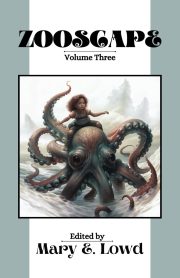Why I Review, or Rather: What Is Reviewing?
by Cameron N. Coulter
 Since March 2018, I’ve been writing a monthly short fiction review column for Skiffy and Fanty. A year ago, I didn’t have too many thoughts on reviewing, but now I find I can have long conversations about it. There’s just so much to it: How do you select what to read or review? To what extent (and how exactly) do you critique what you don’t like? How do you treat authors fairly? Do you couch your reviews in the language of opinion? How do you check your own biases? And how the heck do you balance your personal, subjective experience with an actual objective thing that exists in the world? Recently, after I read Andrea Johnson’s Month of Joy post on Skiffy and Fanty about book reviews, I got thinking about what exactly reviewing is, who reviews are for, and why I do it.
Since March 2018, I’ve been writing a monthly short fiction review column for Skiffy and Fanty. A year ago, I didn’t have too many thoughts on reviewing, but now I find I can have long conversations about it. There’s just so much to it: How do you select what to read or review? To what extent (and how exactly) do you critique what you don’t like? How do you treat authors fairly? Do you couch your reviews in the language of opinion? How do you check your own biases? And how the heck do you balance your personal, subjective experience with an actual objective thing that exists in the world? Recently, after I read Andrea Johnson’s Month of Joy post on Skiffy and Fanty about book reviews, I got thinking about what exactly reviewing is, who reviews are for, and why I do it.
I loved Andrea Johnson’s shameless answer to the question of who her reviews are for: “My book reviews are for me. […] My book reviews are a letter I’ve written to myself about something I’ve read.” For her, reviewing is less about assessing a work and more about reacting to it. It’s a way to process something she’s read and record her experience of reading it. That resonated with me a lot. Reviewers come to reviewing with many motivations, and I think a lot of us are motivated by a desire other than wanting to assess a work for potential readers.
For example, there’s the desire to talk about something we’ve read, to share our thoughts on it, to bring a book to our community of fellow readers and say, “I loved this! You should read it and let me know what you think!” This is what motivates much of the book blogging I’ve done on my own personal blog. On my blog, I hardly ever actually “review” anything, although I continually blog about books. Instead, I share my thoughts, the things I’d be sure to tell a friend when she asks me what I’ve been reading. It’s not reviewing. It’s discussing. It’s participating in a conversation about books, about literature, about this thing called SF that we love. To some extent, all reviewing is this, but some reviewers lean more heavily into this social aspect than others. I’d postulate that a lot of reviews are written not just for the readers, or rather, not just for the readers of the reviews. For us reviewers, it’s a way for us to do what fans love to do: squee about stories we love and encourage others to read them and join the conversation.
That’s why I got into reviewing. My love/obsession with literary SF had hit the point where I was aching for community, aching to engage with other SF nerds. I couldn’t read all these amazing things and then just … not talk about it. By reviewing, I get to participate in and contribute to the SF community, to finally engage in conversations with other SF nerds. I read short stories, and then I write about not only my favorite stories but also the most interesting stories, the ones that give my mind the most to chew over.
For example, I got to rave about gender diverse pronouns when I reviewed Capricious Issue 9. I had a chance to talk about how I often don’t feel represented in romance stories when I reviewed K.M. Szpara’s “You Can Make a Dinosaur, but You Can’t Help Me.” I was prompted to reflect on dis/ability when I reviewed “Assistance” by Kathryn DeFazio and then again when I reviewed “The House on the Moon” by William Alexander, and I got to analyze the possibilities for depicting marriages and families in genre fiction when I reviewed “Harmony” by Seanan McGuire alongside Rafeeat Aliyu’s “58 Rules to Ensure Your Husband Loves You Forever.”
My reviews are written for readers: I avoid significant spoilers, and I use my reviews to shout out my favorite stories, stories that I think other people should check out. To some degree, my reviews are also for writers, as I try to spotlight stories by new writers and writers with marginal identities, writers whose work may not be getting the attention it deserves. But, like Andrea Johnson, my reviews are also for me. For me, reviewing is a chance to discuss new works, an opportunity to begin (or continue) a conversation. It’s an opportunity which in my experience can be somewhat hard to come by, and it’s one for which I’m deeply grateful.
•••
Cameron N. Coulter thinks incessantly about speculative fiction, gender, and intentional communities. His poetry has appeared in Eternal Haunted Summer and Eye to the Telescope. He reviews short genre fiction for Skiffy and Fanty and blogs about social justice, simple living, community, and spirituality at The Ruined Report. He also likes to perform poetry, design ebooks, and tap dance. Cam can be found on his website at cncoulter.com or on Twitter @camncoulter.


